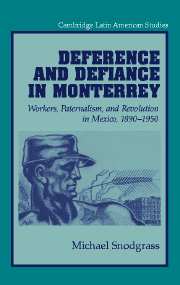Book contents
- Frontmatter
- Contents
- Acknowledgments
- Introduction
- 1 Porfirian Progress in “Mexico's Chicago”
- 2 Revolution Comes to Monterrey
- 3 Work, Gender, and Paternalism at the Cuauhtémoc Brewery
- 4 Making Steel and Forging Men at the Fundidora
- 5 The Democratic Principles of Our Revolution: Labor Movements and Labor Law in the 1920s
- 6 Every Class Has Its Leaders: ASARCO, The Great Depression, and Popular Protest in Monterrey
- 7 Stay with the Company or Go with the Reds
- 8 State Your Position!: Conservatives, Communists, and Cardenismo
- 9 The Quotas of Power: Organized Labor and the Politics of Consensus
- 10 The Persistence of Paternalism
- 11 The Institutionalized Revolution
- Select Bibliography of Primary Sources
- Index
4 - Making Steel and Forging Men at the Fundidora
Published online by Cambridge University Press: 19 August 2009
- Frontmatter
- Contents
- Acknowledgments
- Introduction
- 1 Porfirian Progress in “Mexico's Chicago”
- 2 Revolution Comes to Monterrey
- 3 Work, Gender, and Paternalism at the Cuauhtémoc Brewery
- 4 Making Steel and Forging Men at the Fundidora
- 5 The Democratic Principles of Our Revolution: Labor Movements and Labor Law in the 1920s
- 6 Every Class Has Its Leaders: ASARCO, The Great Depression, and Popular Protest in Monterrey
- 7 Stay with the Company or Go with the Reds
- 8 State Your Position!: Conservatives, Communists, and Cardenismo
- 9 The Quotas of Power: Organized Labor and the Politics of Consensus
- 10 The Persistence of Paternalism
- 11 The Institutionalized Revolution
- Select Bibliography of Primary Sources
- Index
Summary
In 1926, during a commemorative speech to honor the Fundidora steel mill's twenty-fifth anniversary, Director Adolfo Prieto made the ambitious declaration that, “From these workshops and schools will emerge the genuine aristocracy of the national proletariat.” Echoing the ideals of Mexico's revolutionary government, the company adopted the task of “forging the fatherland” by shaping its “men of steel” into exemplary workers and model citizens. The steel workers were to embrace these patriotic ideals. They came to perceive their work as more than the exchange of labor for wages. Steel production assumed the aura of a patriotic mission because, in their minds, no industry played a more significant role in Mexico's economic reconstruction than Monterrey steel. The Fundidora and its employees proudly acclaimed the steel they produced as an “element of peace,” for it would serve “Mexico's progress and its inhabitants' well-being” rather than wartime exigencies. With the products of the steel workers' labor, the nation would build the railroads, bridges, schools, and factories symbolic of the new Mexico. From this sense of mission – and the dangers they faced in the mill – a distinct culture of work, patriotism, and masculinity developed among the steel workers. A popular corrido sung at the Fundidora even eulogized colleagues who lost their lives in the workplace for having “died for the homeland.” The peculiarities of steel making thus led the Fundidora workers to distinguish themselves – and to be perceived locally – as a “caste apart.”
- Type
- Chapter
- Information
- Deference and Defiance in MonterreyWorkers, Paternalism, and Revolution in Mexico, 1890–1950, pp. 82 - 106Publisher: Cambridge University PressPrint publication year: 2003



